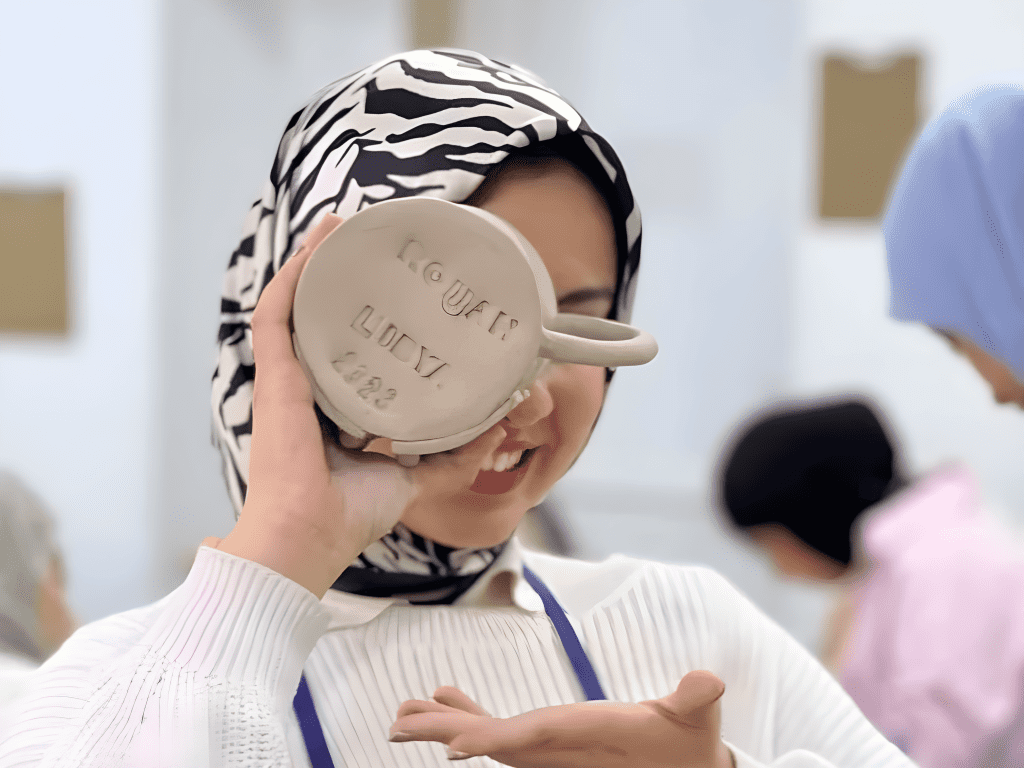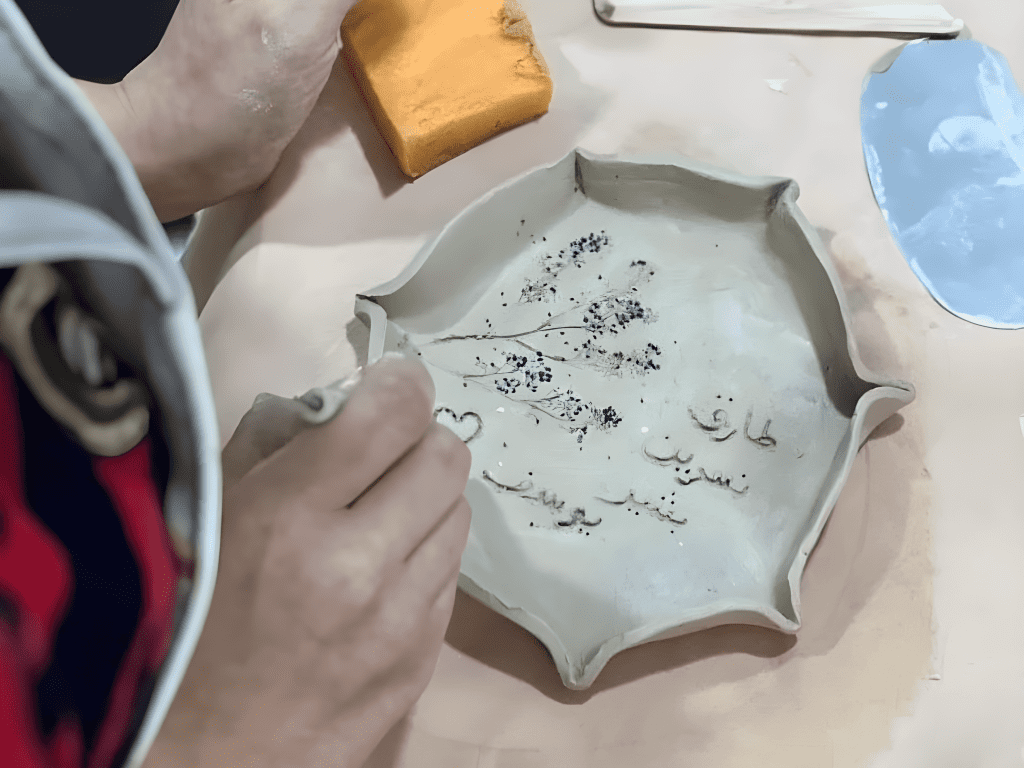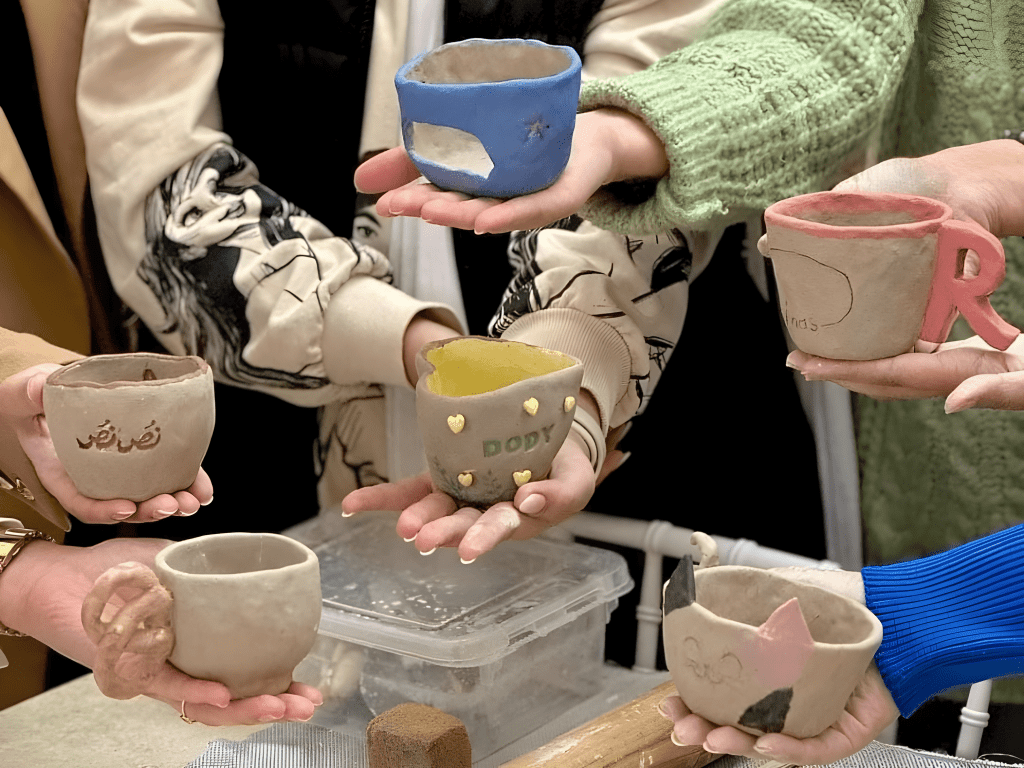Krasiva: Featuring ceramic art in a sustainable spirit in Libya
After graduating from university, Dhekra Tarhouni, 31, decided to try working in her field as a dietitian, but she soon realized she wouldn’t blossom in this area. After thinking and reflecting on her true passion, Dhekra was able to open her art project “Krasiva”, specializing in the manufacture of various pottery and ceramics products. She decided to leave the field of nutrition and turn to the realization of her childhood dream in art.

The beginning of the journey
Through continuous effort and intensive training, Dhekra and her friend were able to become highly skilled in the field of handicrafts. Krasiva’s products are distinguished by their innovative and unique designs that add artistic touches to suit customers’ various tastes. These designs reflect the Libyan identity and enhance the country’s cultural heritage. The project is also singular in that it manufactures pots from scratch, ensuring that each piece is unique, rather than simply drawing on ready-made pots.
The name “Krasiva” adds an extra charm to the project, as Tarhouni draws the name from a previous art lesson. In that lesson, their Russian teacher taught them the word “Krasiva,” which means “beautiful” in Russian. Hence, “Krasiva” has become the common word that expresses the beauty of ceramic art for this unique project.
The Krasiva project produces a variety of pottery products, most notably cups of various shapes and sizes, clay pots, in addition to knick-knacks and artistic gifts. The project is characterized by the use of traditional and modern techniques to create distinctive designs that combine authenticity and modernity, which makes its products very popular among those interested in art and handicrafts.
The project has faced many challenges since its inception, most notably the difficulty of obtaining high-quality white clay. Initially, the company imported clay from Turkey, but high shipping and import costs pushed them to look for more sustainable and economical alternatives. After careful consideration, Dhekra decided to import clay from Spain via Tunisia, where she managed to reduce costs and ensure the quality of the raw materials used in her products.
Dhekra, the Project Manager, spoke about these difficulties: “Despite the challenges I faced at the beginning of the journey, the people around me have always been a source of support and inspiration. They motivated me to keep creating and innovating, and that’s what made me overcome obstacles and succeed.”

Opportunity for development with the European Union
Krasiva received entrepreneurial support from the incubator “Experts France” funded by the European Union, which helped the project grow and expand. Krasiva received a grant fully used to purchase a furnace, which enabled her to grow her project and benefit from this support. Krasiva was selected as the best project in the incubator’s training programs.
The EU-funded business incubator “Experts France” has played a major role in supporting many entrepreneurial projects in Libya, providing outstanding funding and mentorship for creative ideas. One such project was the Krasiva project, which has been a resounding success since its inception thanks to this support. Through this program, Krasiva could overcome initial challenges and expand its business, reflecting the positive impact of entrepreneurial support initiatives in strengthening the local economy and stimulating innovation among Libyan youth.
The art project contributed to the revival of the culture of ceramic art in Libya and promoted interest in this ancient artistic craft. Dhekra stressed that her project is the only one in Libya that manually produces this type of art, making it a unique project in the local market. She stated that the project contributes to the promotion of Libyan cultural heritage by providing artistic products that express the Libyan identity through designs and drawings.
Dhekra and her team plan to increase the monthly production line and expand the training space for daily workshops, so that Krasiva becomes a place to train, exhibit and enjoy a unique artistic experience in the world of ceramics. She is also working on establishing a special exhibition to display and market her craft products.
Dhekra adds about the production process, saying: “The manufacture of pottery goes through several stages and at each stage several aspects must be taken into account, but with continuity and passion I overcame many problems and difficulties, in addition to the high cost of raw materials used in manufacturing, that I tried to solve by searching for sources of production at a lower cost.”
The young woman in her thirties said that she was able to sell her products in most Libyan cities, and even extended her success to international markets, where she sent her products to customers in different European countries. She pointed out that this expansion reflects the quality and excellence enjoyed by Krasiva products.

Turnout and excellence
Customers are an important part of the success or failure of any project, says Muftah Al Ghazal, 30, who is one of the project’s most discerning customers, praising the unique experience provided by the art store in buying gifts. “Krasiva is one of the best online stores for me. The unique and distinctive designs make each piece exclusive to each person, adding great value to the gifts I buy.”
Siham al-Rubaie, 23, sees Krasiva as her favorite destination for ceramics. “I love having the new collections and innovative ideas that the Krasiva team makes. I bought about 20 cups from the project as well as other ceramic artifacts.”
Dhekra and her small team of four hope to expand their business by opening a real store, to strengthen their presence in the Libyan market and interact directly with local customers.
Krasiva strives to become a prominent destination for traditional arts lovers by offering unique products that express the authenticity of Libyan heritage and enhance its position both locally and internationally.




























 Syria
Syria 


